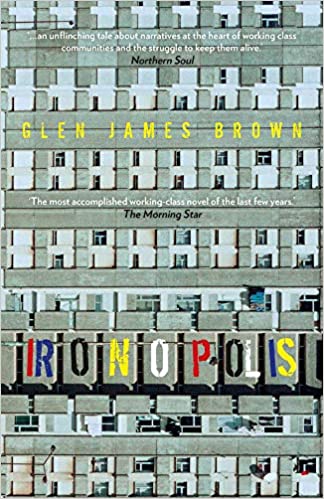The debut novel from Glen James Brown, Ironopolis (Parthian, 2018), was nominated for the Orwell Prize for political fiction as well as the 2020 Portico Prize. In the latest in this series where we ask writers about their passions, habits and dislikes, Brown tells us about his recent dedication to the classics.
What books are on your nightstand?
Glen James Brown: Physically, nothing and I’ve got rid of the TBR pile. I’m trying to read whatever books in the house I haven’t read already—some of them have been knocking about for years. When I want to start another book, I just pick up whichever one is vibrating closest to hand. But saying that, if I get a new book, I can just as easily read that one first. No rules, no pressure. It’s a good feeling.
What’s the last great book you read?
Glen James Brown: Recently, there have been a few. Then We Came To The End by Joshua Ferris, Wayward Lives, Beautiful Experiments by Saidiya Hartman, God’s Own Country by Ross Raisin. I’d never read Mary Gaitskill’s first collection Bad Behaviour until very recently, and that was a lot of fun.
Are there any classic novels that you only recently read for the first time?
Glen James Brown: I’ve been working my way through some of Western literature’s touchstones (Dante, Homer etc.). So much of our subsequent art has been inspired by them and I wanted to better understand not only artistic context, but also the texts themselves. Last year, I read the Richmond Lattimore translation of The Iliad and just recently I finished Emily Wilson’s new translation of The Odyssey.
Can a great book be badly written? What other criteria can overcome bad prose?
Glen James Brown: Prose isn’t a primary concern when it comes to a great book. Voice is more important when sucking me into a story. It’s that hard-to-quantify spark, same with some people you meet: they can be telling you the story of how their fridge died and they had to wait 4 days to get it fixed, so they had to eat all the stuff out of the freezer at once… and you’re just there with them, laughing your arse off. I like books that do the same. If this mercurial quality can then be combined with amazing prose, then you might have something special.
Describe your ideal reading experience (when, where, what, how).
Glen James Brown: I like reading in bed, or in a nice chair with a cup of tea. Nothing too interesting. I also really like reading on the bus (back when buses were still a thing). Commuting is perfect reading time. How in hell people can read in the bath I will never know.
What’s your favourite book no one else has heard of?
Glen James Brown: I’m sure many have heard of it, but a book that left a real impact on me was Smallcreep’s Day by Peter Currell Brown. It went out of print for almost forty years. In it, a man in a huge, perhaps infinite factory, has for decades been pulling the same lever on the same machine on the same bit of conveyor belt to make a small cog. He doesn’t know what the cog does, or where it goes. So one day he decides to follow the cog along the belt and find out. What comes next is part psychedelic nightmare, part meditation on the nature of capitalism and volition. It’s just as pertinent today as it was in the 1960s when he wrote it.
Do you have any comfort reads?
Glen James Brown: Generally, reading is itself comforting, even if the book is ‘difficult’ or whatever. Saying that though, I do enjoy burning through the occasional YA series. Philip Reeve’s Mortal Engines quartet was amazing. I also like learning about history. For example, I recently realised I knew next to nothing about the Crusades, so I’m learning about that.
What book would you most like to see turned into a movie or TV show that hasn’t already been adapted?
Glen James Brown: Samuel Selvon’s The Lonely Londoners would make a fantastic—and topical—TV show. I’d also like someone to give Alejandro González Iñárritu a blank cheque so he can make 2666.
What’s the best book you’ve received as a gift?
Glen James Brown: When I was stuck writing my first novel, my now-girlfriend sent me a copy of The Fortress of Solitude by Jonathan Lethem. The writing was just so fresh and alive that it jolted me out of my funk and gave me a new benchmark to aim for. It reminded me about the exciting potential of language. It was just exactly the right book to receive at exactly the right time.
What’s the most interesting thing you learned from a book recently?
Glen James Brown: I mentioned earlier that I’m reading about the Crusades… and the whole thing was just insane. When the crusaders sacked the ancient city of Antioch and were subsequently besieged by arriving Muslim forces from Syria and Mesopotamia, this peasant mystic called Peter Bartholomew ‘dug up’ the Holy Lance (a bit of the actual spear that he claimed had pierced Christ’s side during the crucifixion). A volatile cult grew up around the spear and caused other crusaders to doubt and fear this relic and the people who believed in it. So it was the real deal, Peter built a massive bonfire and walked through it while holding the lance, thinking it would protect him. He was horrifically burned and died.
The Crusades are a really important juncture in the history of the West and the Near/Middle East. I’m starting to learn how its impact continues to reverberate to this day… but on the other hand, it’s also a bunch of people losing their collective shit in the desert.
Which subjects do you wish more authors would write about?
Glen James Brown: Like most, I’d like to see more diversity in terms of race, genders, sexuality, class. But I think the crucial thing is, writers don’t necessarily have to write about their race, gender, sexuality or class. It shouldn’t define them or their output if they don’t want it to. The change has to come from publishers because these stories are already written and waiting.

Do you prefer books that reach you emotionally, or intellectually?
Glen James Brown: I feel that emotion and intellect are often finely interwoven. You need the one to talk about the other, I think, so I’d say a good book works on both levels.
Which genres do you especially enjoy reading? And which do you avoid?
Glen James Brown: At the moment, I’m really into first-person unreliable narrators. Anything where the story is built on shifting sands. I try to read across as many genres as possible…but I’m not really a fantasy person (high-fantasy in particular: elves and dragons etc.). I guess I like it when there is some connection to the real world. I don’t know if the term itself is contentious—I’m guessing it might be—but I think the Grimdark subgenre bridges this gap, so I’d like to read a bit of that.
How do you organize your books?
Glen James Brown: Roughly alphabetically. Then run out of space and start piling them up all over the show, as is tradition.
Have you ever changed your opinion of a book based on information about the author, or anything else?
Glen James Brown: I often like to read around a writer whose work I’m reading, especially if it directly engages with specific events or periods in time. When I read Hans Fallada, for instance, I found myself reading almost as much about his horrific treatment at the hands of the Nazis. Sometimes this additional knowledge enhances the novels, or allows additional nuance; sometimes it’s just interesting in and of itself.
How have your reading tastes changed over time?
Glen James Brown: I think just like everybody, the more you read, the more you realise how writers do not exist in individual, hermetic voids from one another. Every book has its origin in other books and so you find yourself following the source and in the process, you discover work which you might not, at some earlier point, have fully appreciated.
You’re organizing a literary dinner party. Which three writers, dead or alive, do you invite?
Glen James Brown: Maybe I’d raise up some writers who once loved each other, like Virginia and Leonard Woolf, and I’d cook all the food and get the wine and put some romantic music on, then just leave them alone to catch up while I fucked off down the pub for the night.
Disappointing, overrated, just not good: What book did you feel as if you were supposed to like, and didn’t? Do you remember the last book you put down without finishing?
Glen James Brown: I’m not going to throw shade on anyone. I try not to give up on books, though. Reading in a binary of good book/bad book can mean you lose out on a lot of things. If I can enjoy some element of a book, or take something for my own practice, then the book has served a purpose. Even my favourite books aren’t perfect.
What do you plan to read next?
Glen James Brown: The TBR pile has exploded, so who knows.
Ironopolis by Glen James Brown is available now.
_______________________________________________________________________
Recommended for you:
The Joy of Books with Richard Owain Roberts
Richard Owain Roberts‘ debut novel, Hello Friend We Missed You, has recently been nominated for The Guardian’s Not the Booker Prize. This week, we caught up with him to find out about his reading habits.
_______________________________________________________________________












